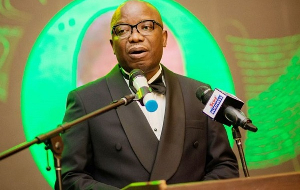 Daniel Kwadwo Owusu is the Country Managing Partner, Deloitte
Daniel Kwadwo Owusu is the Country Managing Partner, Deloitte
The Country Managing Partner of Deloitte Ghana, Daniel Kwadwo Owusu, has urged the government to assure business leaders that the recent appreciation of the cedi is not temporary.
According to him, some businesses remain uncertain about the future of the cedi.
“There are also issues with high utility tariffs, high transportation costs, and the general cost of doing business,” he stated at the 9th Ghana CEO Summit and Expo on May 26, 2025.
Speaking on the topic “Transforming Business and Governance for Ghana’s Economic Reset”, Owusu advised the government to avoid short-term measures that fail to create lasting stability in the absence of fundamental reforms.
He noted that a strong currency is beneficial, but it does not automatically lead to lower prices if domestic cost pressures, such as transportation and energy, are not addressed.
He also called for diversification of the economy, noting that Ghana remains overly reliant on gold and cocoa.
“Diversification will make our economy less vulnerable to those big global price swings,” he said.
“Looking back at 2017, after the IMF bailout programme, the cedi recovered for a time and inflation fell to about 11.8%. Interestingly, just as is happening now, consumer prices didn’t drop significantly,” he added.
“They stayed relatively high because of the deeper structural issues in the economy that have not been addressed,” he emphasised.
Meanwhile, Owusu urged businesses to respond proactively to changes in the economy.
He expressed concern about certain companies quoting foreign exchange rates that differ from those of the Bank of Ghana, stating that this is not reflective of a true economic reset.
“I am speaking to CEOs because there cannot be an economic reset unless we transform as a people,” he concluded.
SSD/MA
Removal of E-Levy will boost financial inclusion – BoG
